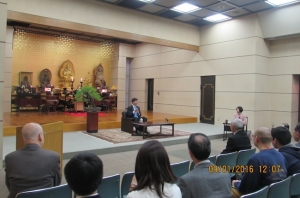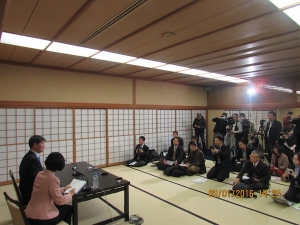Sikyong Discusses ‘Melting Tibet, Threat to Asia’ in Tokyo
TOKYO – Sikyong Dr Lobsang Sangay delivered a speech on ‘Melting Tibet, Threat to Asia’ to a large audience of Japanese, Mongolian and some from East Turkistan, at the Gokokuji temple in Tokyo on 9 January, 2016.
In his address, Sikyong asserted that the world, particularly Asia, should recognise Tibet as a strategic area in terms of environment and its direct impact on the world’s ecosystem.
“Because of the leadership of His Holiness the Dalai Lama and Buddhists around the world, we know why Tibet is important spiritually but lesser known fact is the environmental and geopolitical significance of Tibet,” said Sikyong.
Highlighting Tibet as the third pole of the world and the water tower of Asia, Sikyong said, “The Tibetan plateau has 46,000 glaciers, which makes it the third largest ice reserve in the world, after Antarctica and Arctic. The ten major rivers of Asia originate in Tibet and flow into India, Pakistan, China, Bangladesh, Vietnam, Laos, Cambodia and all the downstream areas. For more than a billion people, these rivers are a source of life.”
Citing recent findings on the retreating Tibetan glaciers, Sikyong said, “In the last 50 years, half of the entire Tibetan glaciers have melted and given the current rate, 2/3 of the glaciers will be gone by 2050.”
“Chinese mega hydropower projects on the rivers originating in the Tibetan plateau would further accelerate the damage on Tibet’s fragile ecosystem and threaten the flow of rivers in the downstream region,” he continued.
Sikyong also spoke on the impact of Tibetan Plateau on global weather system. He cited, “studies have found that the thinning of snow cover on the Tibetan Plateau directly influence more heat waves in Europe and north-east Asia.”
Speaking on the causes of the quick melting of Tibetan glaciers, Sikyong highlighted that mining activities pollute the soil and water, causing soil erosion and accelerating permafrost degradation. Tibet has deposits of about 132 different minerals accounting for a significant share of the world’s reserves of gold, chromite, copper, borax and iron; massive deforestation leading to landslide, silting of rivers and causing flood in the downstream regions; the urbanisation of Tibet with a huge infux of Chinese migrants and large scale exploitation of Tibet’s natural environment and resources influencing sharp rise in the temperature.
Speaking on geopolitical security, Sikyong said that the invasion of Tibet has posed a serious threat to India’s national security, which were evident in the recent Chinese incursions into Indian territories.
“Many of the great Indian leaders, including B.R Ambedkar and Vallabhbhai Jhaverbhai Patel have warned that Chinese invasion of Tibet will pose a serious threat to India for a long time. Their prophecies are coming true,” Sikyong noted, adding that geo-politically Tibet is still relevant.
Sikyong concluded the talk with a brief overview of the Central Tibetan Administration and its democratic form of administration envisioned by His Holiness the Dalai Lama. Sikyong thanked long-time supporters and friends of Tibet.
Sikyong Speaks to Japanese Media persons on Current Situation in Tibet
Explaining the grim political situation prevailing inside Tibet to Japanese media and press, Sikyong compared the Chinese regime to North Korea and apartheid South Africa. He said that Tibetans are issued with identity cards with second-generation high-tech chips by the Chinese authority to monitor their movement.
Sikyong further criticised the Chinese government’s tactic to upgrade Tibet’s towns into cities which have led to wider economic disparity between Tibetans and Chinese, marginalising Tibetans economically by opening up the resources to Chinese migrants. “So far, Tibetan towns such as Chamdo, Shigatse and Nyingtri are being upgraded to cities. Lhasa, the capital city of Tibet, when it was upgraded to city level, the reality in Lhasa was such that over 80% of the city’s economic outlets are owned/run by Chinese,” he said.
Addressing Chinese claims over the right to choose the reincarnation of His Holiness the 14th Dalai Lama, Sikyong vehemently refuted the claim and asserted that historically, politically, spiritually and logically, China has no right over it.
Reporting the bad records of the Chinese authority, Sikyong stated that Chinese authority has destroyed over 98% of monasteries in Tibet and burned Tibetan Buddhist scriptures. “Chinese Communist leader Mao Zedong once said that ‘Religion is poison’ so why the Chinese authorities are keen to recognise the reincarnation,” Sikyong asked.
Sikyong vigorously said that His Holiness the Dalai Lama who turned 80 this year is healthy and robust, and asserted that only His Holiness the Dalai Lama has the final authority over his incarnation.
Source: www.tibet.net




comment 0